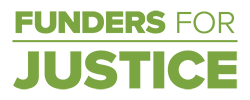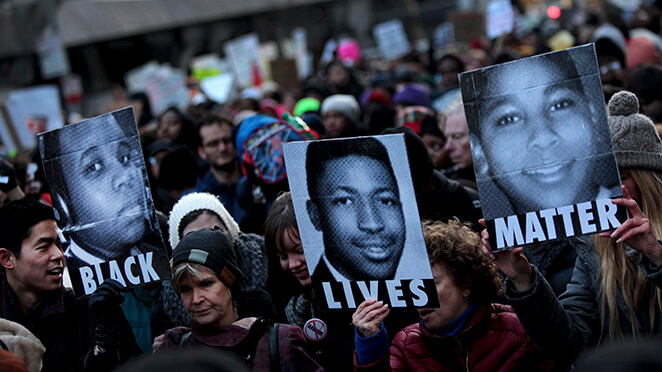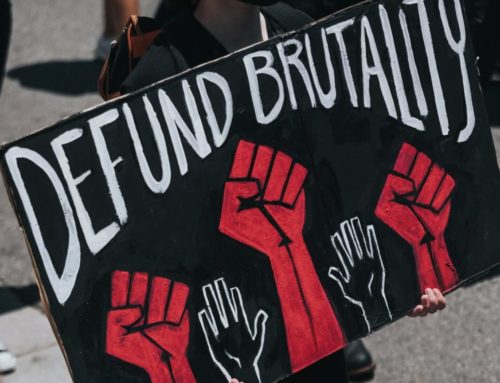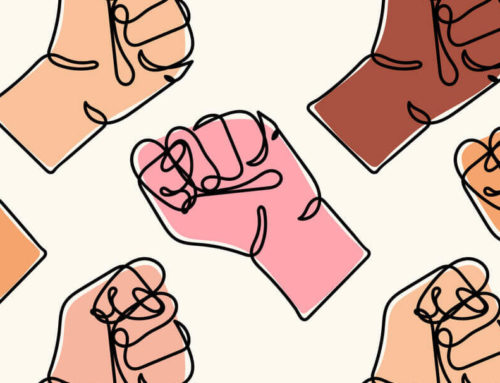Darren Walker, President, Ford Foundation
Nearly a half century ago, during the final days of Dr. Martin Luther King Jr.’s life, he penned what he called a “testament of hope,” an epistle he could not have known would be among his last. “Whenever I am asked my opinion of the current state of the civil rights movement,” Dr. King began, “I am forced to pause; it is not easy to describe a crisis so profound that it has caused the most powerful nation in the world to stagger in confusion and bewilderment.”
During these past few weeks, as each of us has attempted to make sense of Michael Brown and Eric Garner’s senseless killings, “confusion and bewilderment” abound. In private moments and public demonstrations, we have been overwhelmed with emotion. We have grappled with disbelief, frustration, shame, and anger.
Yet, confronted anew with a crisis as old as the country, it’s my conviction that we must give our own testament of hope.
There is hope, for example, in the fact that I can compose this essay from my desk at the Ford Foundation; that a black, gay man — born to a brave single mother in a Louisiana charity hospital, the product of Head Start, public schools, and Pell Grants — can rise to become president of a prominent global foundation.
There is hope in knowing that, from the trial of conscience so many Americans are now experiencing, we can emerge — and perhaps are emerging — a more unified, more equal, more just America.
Founding Contradiction
I draw this hope from the incredible demonstrations still unfolding across the country — demonstrations heartening not only for their message, but their make-up. People of all backgrounds, young people in particular, rallying for justice is a powerful, transformative sight. I hope we keep seeing it.
Goodness knows we need our eyes opened. Too often a majority of Americans seek comfort in the idea of American exceptionalism, the idea that no matter our flaws we are fundamentally righteous and just. So it bears repeating that the United States was in fact founded on a fundamental contradiction that, two centuries later, remains dauntingly unresolved: The founders pledged their sacred honor to the idea that “all men are created equal,” while in the same instant creating a nation in which they are patently not equal.
Among the many compromises that made possible our charters of freedom were choices to count my enslaved ancestors as three-fifths of a person; to protect the bondage and sale of children; to legitimize hierarchies of gender, class, and skin color.
Alexis de Tocqueville saw this dissonance in our national character quite clearly as he traveled across our early republic. On one hand, early America was distinctive in its communitarian and entrepreneurial equality, he noted. On the other, the issues of slavery and racial inequality were “the most formidable of all the ills which threaten the future existence of the Union.”
He was right on both counts, of course. We are the inheritors of both parts of this heritage: the sense of promise as well as the tendency toward persecution.
It is understandable, then, that more than two centuries later — after a civil war and a movement for civil rights — we should feel confused and bewildered when this contradiction emerges into our national consciousness yet again.
The Moment We’re In
The story of who we are, how far we have come, and how far we still have to go — all these parts of our past are prologue to the moment we are in. In moments like this, it is useful to recognize that our present is a product of the past, mixed with our hopes for the future. We can’t, therefore — and should not be tempted to — look only at the specifics of what Michael Brown or Eric Garner did or didn’t do. To understand what happened to them, and so many others like them, we have to look beyond the immediate. We have to grapple with the past and how it infects the present; how individual episodes are linked to larger social habits and forces.
As I joined tens of thousands of marchers in Manhattan last weekend, I was struck by the powerful juxtaposition of the countless New York City police officers who helped ensure a peaceable assembly during a protest centered on the police department itself, as well as the larger justice system. It’s essential to pay respect to these courageous individuals who, more often than not, put themselves in harm’s way for our communal well-being. When individuals decide to become police officers, they are not just choosing a career; they are answering a calling. I, for one, am grateful for the service they commit to.
But the justice system is more than the people who occupy it at any given time. It, too, is the product of the past, with rules, procedures, and mores that constitute a complex web of history, practice, and aspiration. So let’s be honest with ourselves and acknowledge that our criminal justice system — no matter the best intentions of the people who comprise it — remains functionally, structurally, insistently unjust. This is why many people, especially in poor communities of color, perceive policing as a mechanism of social control. Far, far too many Michaels and Erics have lost their lives for these communities to see it any other way.
Legal scholar Michelle Alexander makes the case in her powerful book, The New Jim Crow. America’s unequal drug laws, mandatory prison sentences, and mass incarceration of black and brown men for nonviolent crimes are as onerous today as Jim Crow laws were in their day, and have set in motion a vicious cycle. Black men have their basic rights revoked, which traps families in poverty, which contributes to crime. As a result, she reports, more African Americans are part of the criminal justice system today than were enslaved on the eve of the Civil War.
My Life Experience
To me the injustice of our system is intensely personal. My childhood friends were cousins — boys with talents, and passions, and potential no different from my own. My mother moved my sister and me from a segregated small town in Louisiana to Texas in hopes of giving us a better life. My cousins, however, found themselves ensnared in the same cycle that has trapped so many young black men. By my count, five of them have spent significant time in prison, including one who died by hanging himself while incarcerated.
When I was in college at the University of Texas, I knew I would be held to a different standard than my white friends when it came to recreational drug use, which was prevalent, especially among the privileged students from Houston and Dallas. At a party in my dorm, when a friend passed me a joint, I knew to decline. When he was arrested later that year for possession of marijuana, his father had it taken care of. Whatever happened was expunged from his record; today he has a wonderful life and beautiful family in a prosperous Texas suburb. As a black kid — a young black man without means — I knew implicitly that if I were ever to be brought into the criminal justice system, my dreams would be snuffed out in an instant.
My point is: The distance between promise and peril, between justice and injustice, is frighteningly short — especially for people of color and low-income Americans.
No one wants this — particularly those who work in our justice system and law enforcement. This is not by our design. Rather, it’s a system rooted in that same complex web of historical inequality — racial, social, and economic — that predates any of us. A system that created the context for Michael Brown and Eric Garner’s killings, and for countless other stories just as heartbreaking and infuriating. This system is the reason we find ourselves watching videos of Eric Garner begging for mercy while receiving treatment not even befitting an animal.
This is not the America we want. This is not the America we are proud of.
Inequality Beyond Race
Indeed, this week new data showed that the income gap between black and white Americans is widening, not narrowing. We already know that overall inequality in the country is rising — meaning that the rich are getting richer while the middle class loses ground. So as the country overall becomes wealthier, people in general feel poorer. This leaves Americans of every creed and color feeling less secure and more vulnerable — not just economically, but socially and culturally, as well. And as a result, Americans — middle-class Americans, in particular — are too worried about their own problems to see a priority in the plight of others.
As the political scientist Robert Putnam has shown, within this era of economic and social distancing, we have become less motivated to solve big problems collectively. In this way, our “civic infrastructure” has deteriorated and our discourse has coarsened.
This might suggest that coming to terms with race in an era of growing inequality is harder than ever.
And yet, despite all of this — or, perhaps, in some strange way, because of it — I am hopeful. The people on the streets are making it possible.
To borrow a phrase from my youth, the whole world is watching. Up close. Just as our parents and grandparents were a half century ago — only this time on devices in our hands, not televisions in our living rooms.
This can be a tipping point, a time and place where we see the bending in the “arc of the moral universe.” While our history has been informed by a contradiction, it also has been defined by what James Baldwin called “the perpetual achievement of the impossible.”
Achieving the Impossible
So, how do we escape the quagmire? How do we “achieve the impossible” again? To start with, we need smarter investment in better policing.
We need investment in the human capabilities of our police officers — in their professional development, in their training, in their ability to relate to and understand the communities they serve. We need to redirect funding to community policing, which has fallen out of favor in the age of “stop-and-frisk” policies, “broken-widows” theory, and “three-strikes-you’re-out” theology.
What we do not need is more of the militarization we saw in Ferguson — nor more of the menacing weaponry that has been shipped from battlefields in Iraq to precincts across the United States. (And, by the way, maybe police would not have reason to be so afraid of young people with guns if guns were not so readily available virtually everywhere.) Instead, we, as a democracy, should give our police the best tools and techniques to match their best intentions and then hold them accountable.
At the same time, we need to engage with and empower communities. We need to ensure that the people affected by policy have a voice in creating it. We need to invest in our neighborhoods and cities, because while talent is everywhere, economic opportunity is not.
As I have traveled the United States — from New York to Detroit, Chicago, and St. Louis — I hear the same things. People, especially young people, want jobs. They want to do well for their families, to do right by their neighbors, and to do good in their communities. Sybrina Fulton, the mother of Trayvon Martin — another gunned-down, young black man — put it so well: “People are now realizing [our movement] is not just about African-American rights; it is about human rights.”
And this larger movement for human rights is inseparable from the necessary work of repairing our broken politics — the heavy lifting of owning up to the biases and injustices that are deeply embedded within our system.
All of this will require political courage. We need statesmen and stateswomen to bring us together, not politicians to degrade our discourse and drive us apart. We need people of purpose to transcend the politics of division — in spite of the fact that the rhetoric of exclusion is such a successful political tactic.
A New Testament of Hope
Ultimately, there is a larger force at work. There is something stirring us to action — demanding that we trade confusion and bewilderment for a fight for change that only hope and radical optimism can sustain. The memories of Michael Brown, Eric Garner, and too many others — the legacies of all those who suffered and sacrificed before us — deserve no less.
In his testament of hope, Dr. King wrote that “man has the capacity to do right as well as wrong, and his history is a path upward, not downward….This is why I remain an optimist.”
So, too, must it be with us. Let us continue to seek right in the face of misdirected might. Let us continue to make our way upward.
For my part, I have deep, abiding, and absolute faith that America will. Through fits and starts, feats and defeats, fairness will triumph. The irrepressible current of justice will carry us forward, no matter the impediments ahead.
Why do I believe we shall overcome? Because, time and again, we have.
Read the original post on Medium.



